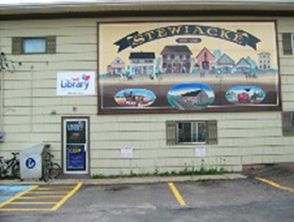KJIPUKTUK (Halifax) – Budget pressures are bringing public libraries in rural Nova Scotia to their knees. Staff hours are reduced, entire programs are eliminated, and branches are cutting back on opening hours.
Things can’t possibly get much worse, library workers tell the Nova Scotia Advocate.
Fighting a losing battle
“We will have to cut hours,” says Eric Stackhouse, chief librarian for the Pictou-Antigonish Regional Library. Which in turn will cause a lot of part time staff to lose their benefits, because of the way the insurer contract is structured.

The situation is even more dire for the Eastern Counties Regional Library, serving Guysborough, Inverness and Richmond Counties.
“This year we’ve downsized positions, we cut our on-line reference service, our books by mail service, we’ve eliminated one full time cataloguing position at headquarters,” chief librarian Laura Emery tells the Nova Scotia Advocate.
“All in preparation of yet another year of zero funding increases,” she adds. “We are literally at the lowest we can go. We are there now. We are done. Next thing to go is books.”
“People don’t feel they have a future at their job, and seeing people being laid off, and losing work, that demoralizes the rest of the workforce. People get ill, people are stressed,” says Emery.
The situation is just as dire anywhere else in the province, says Ruby McDorman, president of the Library Boards Association of Nova Scotia (LBANS), an umbrella organization of all nine regional Library Boards.
“Most regions just don’t have the funding to carry on with all of their programs, they are not able to give their staff raises, the money just isn’t there,” says McDorman. “It seems we are fighting a losing battle all the time.”
Decades of underfunding and frozen budgets
A 2013 report commissioned by LBANS says more money is needed for regional libraries, and suggests that the provincial funding formula be changed from population-based to service-based. After all, whether you have 400 people come to your branch or 300 makes no difference, it still takes just as much money to operate.
Provincial governments are on the hook for between 70 and 80 percent of the budget for public libraries in rural Nova Scotia. Municipalities and voluntary sponsors take care of the rest. Libraries in HRM also face budget pressures, but funding is mostly municipal.
It really hurts when provincial politicians keep budgets frozen year after year.
The last 17 years have been marked by underfunding and frozen budgets, says Stackhouse. “We’re getting to our seventh year without any kind of funding increase, and there is no end in sight.”
It’s a recipe for disaster. Budgets remain frozen, but meanwhile everything gets more expensive.
And no light at the end of the tunnel. Stackhouse says that he has been told not to expect any budget increases for the next three years. Or any adjustments for inflation for that matter.
“I don’t understand the reasoning,” Stackhouse says. “It’s such a small amount of money, compared to a lot of other things the government spends money on. It is so easily fixed, and it does so much good.”
Vital services, not just books, on the chopping block
There are 70+ public library branches that provide a vital service to rural Nova Scotians. The lending of books is a big part of it, but there is so much more libraries do.
“All our libraries are busy, even over March break we had a huge amount of programs. Not only readers and authors events, but also technology events. Kids were making robotics and machines,” says Stackhouse.
“Many kids don’t have the opportunity to go South and it is so important that they have something educational and constructive to do. It’s also a great chance for parents to get together and talk.”
Libraries in Nova Scotia’s towns are buzzing with activity.
“I am amazed by the use our Antigonish library gets,” says Stackhouse. “The number of visits goes up and up.
“It’s amazing the number of people who come in, to see art, to take literacy classes, to attend programs, to borrow books, to use the internet, it goes on and on.”
There are well over 300,000 public library members in the province and close to 4 million library visits per year.
In many cases municipalities and fundraisers have been picking up the slack created by the province. Now there is a sense that after many years of austerity these sources are pretty well exhausted.
“Our communities are very generous, they give more than you could ever imagine. But there is so much to support, the hospital, shelters, food banks,” says Emery. “And our volunteers are run off their feet.”
Does anybody care?
The province doesn’t share the librarians’ sense of urgency..
“At their request, we worked with library boards to review the current funding model and to determine a new approach to maintaining core library services. Libraries are now providing feedback but no decisions have been made,” writes Krista Higdon, a spokesperson for the Department of Communities, Culture and Heritage.
“While it’s hard to compare library funding jurisdiction to jurisdiction, Nova Scotia provides $14.4 million annually in grants to library boards. All of our funding commitments will be released in our upcoming budget in April,” Higdon writes.
Library workers are not reassured. But they recognize that things will not change until people start complaining to provincial politicians.
So far it’s been pretty quiet.
“People don’t understand how libraries are funded,” says Stackhouse. And libraries have always figured out ways to shield their users from the cuts. “It’s part of our genetic makeup to provide those services, no matter what,” he jokes.
“And a lot of the people we do work with don’t make a lot of money, their voice is lost,” he says.
Emery agrees.
“Often our people aren’t comfortable in speaking out. Poor people and people under stress can’t be held responsible.
“We need the support from those people who believe other people need libraries. People like us.”
Here are a few LBANS suggestions on what to do if you feel Nova Scotia’s libraries deserve better.
Featured photo: Colchester – East Hants Public Library




Libraries are Cheap Ignorance is Costly
La Nouvelle-Écosse avait un excellent réseau de bibliothèque lorsque nous y vivions. De beaucoup supérieur à ce que nous trouvons au Québec. Maintenant menacé par leur gouvernement “libéral”.
Nova Scotia had a very good public library network when we lived there. It is under threat by the “liberal” government of that province.